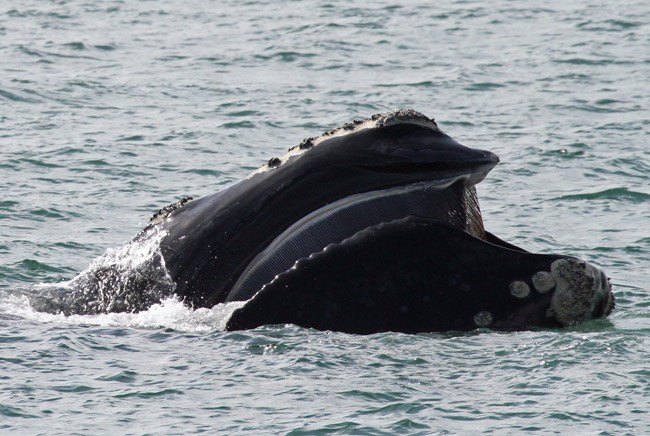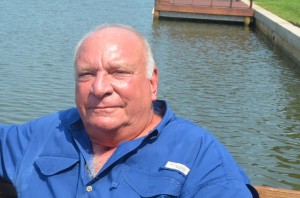
Just eight months after declining to join the Flagler County Commission in opposition to fracking and seismic testing offshore, the Palm Coast City Council in a decisive turn-around Tuesday said it would support a resolution opposing fracking, and would seek to forward the resolution to the Florida Legislature and the Florida League of Cities, both of which are favoring the new oil-extraction method.
Strikingly, the two members of the council who had least favored voicing opposition in July—Mayor Jon Netts and council member Bill McGuire—were the most vocal advocates of a resolution opposing the practice locally. McGuire is concerned about fracking’s effects on freshwater resources. Netts is concerned about that as well as displeased with the state Legislature’s continuing erosion of local authority.
The Florida Senate bill addressing fracking would forbid counties and cities from regulating fracking or imposing moratoriums on the practice, reserving to the state all means of regulation and permitting. The Florida League of Cities had opposed that approach. But an amendment to the bill’s House companion opened the dfoor for local governments to still have authority in land-use regulations, such as zoning, even when involving fracking. While the League of Cities decided to endorse that approach, the wording of the House bill’s amendment is very vague, and left Palm Coast officials too troubled to endorse.
The House bill now premits local regulation “so long as such zoning or land use requirements would not impose a moratorium on, effectively prohibit, or inordinately burden one or more of these activities on a subject property.” (Emphasis added.)
“Those two words right here are giving me some pause,” Bill Reischmann, the Palm Coast council’s attorney, said at a council workshop on the issue this morning, “because if we were to pass the zoning regulation, what would be the purpose of that? To protect our water supply or to protect our environment. We would want to be doing something that would place some structure and restrictions on them to protect it. Now, that’s a matter of perspective, and I would imagine that as this would be a brand new law that passed, the perspective of the industry would be that any such regulation would likely be an ‘inordinate burden,’ so you can anticipate what will happen then.” By which Reischmann meant: litigation against local governments that would attempt to regulate against fracking. “So it’s that kind of language that is not defined, otherwise defined in these house bills that would certainly give me some concern if we were to do what other local governments are thinking about doping or are in the process of doing or have done recently to ban or try to prohibit this fracking or hydraulic fracturing.”
A practice and jobs not worth the risks, and displeasure at Tallahassee’s undermining of home rule.
Hydraulic fracturing is a relatively new way of extracting oil. Rather than drilling a pipe vertically into the ground or the ocean floor to extract crude oil from what amounts to underground reservoirs of the stuff, hydraulic fracturing goes in vertically to bedrock then horizontally across and fires water, sand and chemicals at immense pressure against shale deposits, fracturing those deposits and releasing the oil and gas they contain. The practice is now widespread in the Midwest where, before the oil-price collapse (which fracking helped bring about by further flooding the market with oil), it had helped push American oil production back up to heights nearly 10 million barrels a day, heights last seen in 1972. But that was when prices were two, three and four times what they are today.
Oil prices have dropped to below $30 a barrel, the lowest level since 2003. Trade analysts place the break-even point for fracking’s viability at $66 a barrel, and don’t see the price of oil climbing past $40 or $50 for the next several years. That alone means no fracking will likely take place in or around Florida in the coming years. But that doesn’t change the Florida Legislature’s intent: to have a law in place that regulates the matter, if and when fracking becomes viable again.
Federal moves are afoot to open Florida’s Atlantic coast to exploration, whether by fracking or more conventional means, with a moratorium on actual exploitation of oil expiring in 2022. There is no moratorium on exploration, which involves its own disruptive means, as Denise Bevan, a city administration coordinator, explained to the council this morning.
“To explore for oil, typically the main type of surveys that, at least I found, is what’s called the seismic surveys, and that’s a collective of different types of methodology,” Bevan said, citing an “airgun approach.”
“So you have a vessel, it shoots off basically a bunch of air, creates a vibration, hits the bottom floor of the ocean, transcends through some layers, comes back, and it’s collected,” Bevan said. “And of course from the echoes coming back to the vessel and the equipment, that’s one of the concerns, and also the deep stratigraphic tests, the drills, actually creating a disturbance on the ocean floor. Again this is focusing on oil production specifically.” She added: “Of course when you’re talking about introducing large amounts of sound into the ocean, there is a focus on the marine mammal population, also sea turtles, fisheries, the list goes on.” Among the affected species: right whales, which are critically endangered, and whose pilgrimage route parallels Florida’s east coast between November and April.
Palm Coast is not concerned about fracking in Flagler County: that’s not a likely possibility. But city officials are concerned about fracking offshore.

“That’s my quandary,” McGuire said, “is if they do this offshore, which we have nothing to say about, but it affects the quality of our water in palm Coast, how will we know, and what can we do?”
“When all of a sudden you start tasting methanol, hydrochloric acid, petroleum distillants in your water,” Netts said, “that’s how you’re going to know. I don’t think there’s any other way to accurately measure the intrusion of these chemicals.”
Netts said the larger issue is not fracking per se, but state government’s continued intrusion—like a fracking drill snaking its way sideways to undermine local authority–on home rule. “I’m opposed to any more preemptions by Tallahassee of local governments,” Netts said. “If we decide that fracking is good for us, that ought to be our decision as long as we can contain it to our environment. But I don’t like the idea that the Florida Legislature is taking back things that they gave us. I am not at all convinced that by virtue of being in Tallahassee you’re smarter or more knowledgeable than local government.”
Remarkably, Netts and McGuire, who have habitually favored industry, proved to be the council’s most vocal environmentalists today. “I’m not seeing anything that tells me that fracking is desirable for the east coast of Florida,” Netts said. “The cost-benefit analysis tells me it’s not worth it. That issue is important. But as big an issue tom me is this gradual erosion of local governments’ authority. That just bothers me.”
McGuire last year had spoken against regulation of fracking from a free-market perspective. There was none of that today. “It hasn’t been too many years ago that a platform drill over off the shore of Tampa broke an underwater coupling and polluted how many hundred miles of shore and just killed wildlife and fish and turtles and everything else,” McGuire said, referring to the Deepwater Horizon disaster.
Council member Jason DeLorenzo’s position synthesized the mayor’s and McGuire’s “There’s jobs, for sure, but why would you risk the entire state economy just for some jobs, and potentially short-term jobs. There’s only so much there,” DeLorenzo said. “You’re risking the entire state’s economy and long-term viability of your fresh0-drinking water for some jobs. In the big scheme of things it’s not substantial.”
So they came to agree on drafting a resolution opposing fracking. They were not clear regarding seismic testing. Aside from Flagler County, Bay, Franklin, Gadsden, Gulf, Jackson, Jefferson, Leon, Madison, Taylor, Wakulla and Washington county commissions have all approved resolutions opposing fracking since last July.
Palm Coast’s resolution will be drafted and ready for approval later this month.





























Algernon says
Good work and intentions by Council on this one!
Anonymous says
If the people do not want it in their Countys or Citys that should be up to them.
Woody says
Finally I can agree that the city got something right.I hate to say it but GOOD JOB.
tulip says
Palm Coast City Council—Thank you for finally deciding to oppose fracking!! This is one of your better decisions. It’s great to see that the council and county commissioners have come to a mutual decision on such a vital matter.
Veteran says
If that were true anonymous there would be no fracking.
Edman says
YEAH !!!!
confidential says
I totally appreciate this time our City of Palm Coast Council…YES!! Lets protect our water from greed and pollution. Create better job sources, NO FRACKING!
Sherry says
Great News! Our environment should come first! We are the “Sunshine State”. . . we should embrace solar and wind energies and move away from fossil and nuclear fuels!
Jim Bob says
That boat has already sailed and, oddly, its home port is landlocked Tallahassee.
wishful thinking says
Great news ! Need to make sure Legislature and Gov don’t do what they did to Miami-Dade County:
took away all local power from the county to regulate and control ‘rock mining’ which was allowed previously on a per request basis. In fact state passed staturte which we repealed in one session ( Miami New Times on line ” Better Lake than Never” still on the web) which made residents responsible to telling buyers that they were going to buy homes ‘dangerously close’ ( within 3 miles) of the blasting. . 16 years later they are trying to bring back that insane statute and revising the 3 mile ‘danger zone’ to 2 miles.
Flagler County and Palm Coast, Bunnell, Flagler Beach should get together and make one big Ordinance telling the state to mind their own business and let us – not them- control our ‘immediate’ environment
Eva Teuton says
Thank you so much for your decision to oppose fracking. I am enjoying local oysters today and will be able to continue enjoying them.